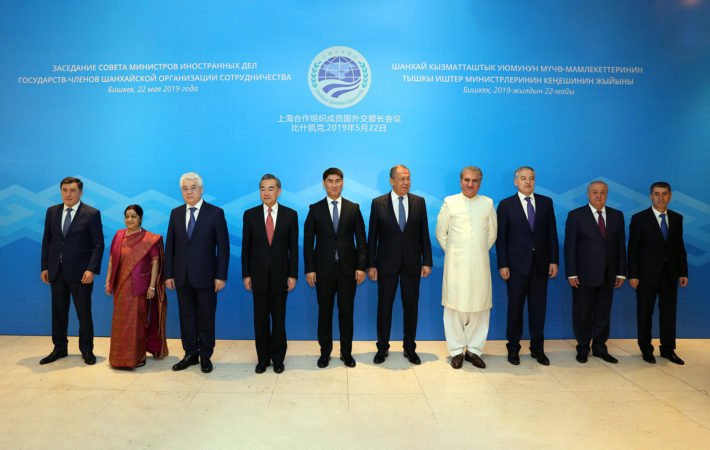India and the Shanghai Cooperation Organization: Unexplored Possibilities and a Promising Future

India’s Former Indian External Affairs Minister Sushma Swaraj attended the Meeting of Council of Foreign Ministers of the Shanghai Cooperation Organization held in Bishkek, the capital of Kyrgyzstan, on 21-22 May 2019. This was the last international level engagement that India engaged in under the previous Modi administration and the last contribution of Sushma Swaraj in her capacity as the External Affairs Minister. India’s eventual inclusion in the Shanghai Cooperation Organization in 2016, along with Pakistan, was the first expansion of the regional establishment that was formed in 2001.
The Shanghai Cooperation Organization is considered a Eurasian political, economic and security alliance. The founding members were the People’s Republic of China, the Republic of Kazakhstan, the Kyrgyz Republic, the Russian Federation, the Republic of Tajikistan and the Republic of Uzbekistan. The membership of the organization was increased to 8 members with the inclusion of India and Pakistan as full members on 9 June 2017 at the summit in Astana, Kazakhstan. The organization is not a pan-Asian organization with its focus largely on the Central Asian region, with the Association of the Southeast Asian States responsible for building regional security architecture in Asia and facilitating cooperation among member states belonging to East Asia. Ashok Sajjanhar, the former Ambassador of India to Kazakhstan, Sweden and Latvia, argues that the organization is still a work in progress. While the organization has concluded several promising agreements since its formation, Amb. Sajjanhar claims that “their implementation, however, seems uninspiring.” The organization was created under the leadership of China supported by Russia, but it is yet to evolve into a cohesive entity. India’s interest in the Shanghai Cooperation Organization is no surprise: as a rising power in the region, it is imperative for India to engage with regional arrangements that can prevent its exclusion from the region by other political actors. Chinese opposition to the inclusion of India prior to the formal announcement in Tashkent on May 24, 2016, is a testament of regional competition and the growing recognition of India’s geopolitical significance.
The inclusion of India after overcoming the several obstacles was a diplomatic victory that opened the doors of possibility in Central Asia. Becoming an observer in 2005, the clear demonstration of interest by India to pursue a more substantive role in the development of the organization for over a decade has been rewarded with the membership and the opportunity to pursue mutually beneficial objectives. This must now be addressed by India and the Shanghai Cooperation Organization must be given the importance it deserves, once again under the leadership of Prime Minister Modi. The strategic, geopolitical, economic and security interests of India are heavily linked to the development of the region. For India, being a member of the Shanghai Cooperation Organization secures safe transports routes through a larger extended neighbourhood, provides a market for the purchase of energy resources to satisfy increasing Indian demand, combat the threat of terrorism in the region and explore the possibilities of regional cooperation with Central Asian countries that has been neglected for too long. India’s leadership will have the opportunity to interact frequently with the leadership of the members of the organization, facilitating participation in initiatives and pursuing shared objectives.
The Council of Foreign Ministers holds frequent meetings to address regional and international concerns. The meeting in Bishkek was chaired by Foreign Minister of the Kyrgyz Republic Chingiz Aidarbekov. In a press release dated 22 May 2019, the organization stated that the agenda for the meeting included reviewing of the implementation of the decisions of the Heads of States Council meeting (Qingdao, 9-10 June 2018) and the Heads of Government Council meeting (Dushanbe, 11-12 October 2018), reviewing the priority goals of upcoming activity in preparation for the upcoming Heads of State Council meeting in Bishkek in June 2019 and discussion of major international and regional issues. In the media briefing following the meeting, the Secretary-General of the Shanghai Cooperation Organization Vladimir Norov said that “the foreign ministers had approved a substantial package of documents” that “aim to enhance cooperation between the regions of the SCO countries, strengthen the fight against illicit drug trafficking and establishing cooperation in information technology, environment protection, healthcare and sports.”
In her speech to the Council, Swaraj said that the “SCO must support the member countries’ candidatures for the non-permanent membership of UNSC for the years 2021-2022 and 2027-2028.” Notably, the SCO press release states that the ministers noted the intention of India to seek a non-permanent seat in the UN Security Council. Addressing the meeting, Swaraj focused on increased counterterrorism cooperation, commitment to regional connectivity and securing peace in Afghanistan. Bringing up the Pulwama attack and showing support for Sri Lanka, the External Affairs Minister claimed that India was even more determined now to fighting terrorism in the region and India would consider new ideas to “make the Regional Anti-Terrorist Structure (RATS) more effective” to achieve “comprehensive, cooperative and sustainable security.” Swaraj made it clear that India is committed to the emergence of a peaceful, stable and secure Afghanistan. She stated that India attaches significance to the SCO Afghanistan Contact Group and welcomed “an early conclusion of the Draft Roadmap of further actions of the Contact Group.” India seems to be following the “Shanghai Spirit” which implies mutual trust, mutual advantage, equality, reciprocal consultations, respect for the diversity of cultures and a striving for joint development, with the aim of integrating itself into a regional organization that promises a mutually beneficial relationship in the long run.
A noteworthy moment in Swaraj’s visit to Bishkek was her interaction with President Sooronbay Jeenbekov of the Kyrgyz Republic ahead of the Council meeting. Ministry of External Affairs spokesperson Raveesh Kumar said that there is “visible enthusiasm to expand bilateral relations across all sectors, as both countries commit to exploring untapped potential.” The Kyrgyz Republic, like other Central Asian countries, has become important in ensuring regional connectivity, cooperation and security which is a foreign policy priority for India, especially under the Modi administration. The opportunity for Swaraj to interact with the Kyrgyz President was a small but a sure step forward in pursuing that objective. Media reports also claimed that the minister exchanged pleasantries with her Pakistani counterpart, Foreign Minister Shah Mehmood Qureshi. Amid the strained ties between the two neighbours, the Ministry of External Affairs was quick to state that no meeting took place between them.
With the new administration in place now and Dr Subrahmanyam Jaishankar taking over the reins of the Ministry of External Affairs, Sushma Swaraj’s contribution in Bishkek is valuable for the future of Indian foreign policy in the region. India’s contribution to the drafting of the Qingdao Declaration, rejection of the Belt and Road Initiative accepted by all the other members, and its belief in multilateralism prove that it can successfully be a member of the largest regional organization in terms of geographical coverage and population and exert its influence as a rising regional power without succumbing to Chinese dominance. The realization of common interests is a fundamental pillar for cooperation and the geostrategic importance of the alliance cannot be overlooked. While India adds to the weight that the Shanghai Cooperation Organization carries in the international arena, the organization can consistently function as a platform to put forth objectives and interests that can be jointly pursued for the benefit of all parties. The relationship between India and the Shanghai Cooperation Organization is in its nascent stage, with various unexplored possibilities for cooperation and collaboration among members, and the meeting of the Council of Heads of States later this month will be the next step in a very long and interesting journey.


















